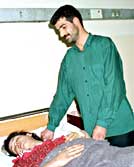|
High incidence among veterans' children |
"The 67 cases of congenital birth defects
we have here now were born in the month of
August 1999 at hospitals in Basra."
Firas Abdul Abass (33), pediatrician at Basra
Pediatric and Maternity Hospital, looked
at pictures of babies with congenital defects
displayed on the wall in the large conference
room of that hospital.
![]() Three or four times more than before the
war
Three or four times more than before the
war
"These babies have bone abnormalities. These have cleft palates. This baby had no brain. This one had almost no skin. Here is an odd abnormality of the head and neck. This is a case of what is called phocomelia." Firas' explanation continued. Most of them were dead at birth or lived only a short time.
Perhaps because Firas had just taken me to visit children hospitalized with leukemia and other cancers, I found looking at these pictures extremely painful.
"Compared to before the Gulf war in 1991, the number of children born in Basra with congenital defects has increased three or four times. It's similar to the increase in the incidence of cancer."
While I was listening to Firas' explanation, a maternity ward nurse came running in and said, "We just delivered a stillbirth. The doctor said you can take a picture if you wish."
We walked the long corridor from the pediatric
ward to the maternity ward and headed for
the operating room. A young man who appeared
to be the father and several female relatives
wearing the traditional Muslim hejab were
standing in the hall looking worried.
![]() Twice. Why?
Twice. Why?
The baby taken from its mother's womb by caesarean section was 40 to 50 centimeters long. It had virtually no brain. It had six fingers and toes. The mother, her surgery complete, was placed on the cart and taken back to her ward.
"The father is a Gulf War veteran. Last year in January they lost another baby. It was just like this one." The attending physician Faiz Alwaeely (32) wiped sweat from his brow as he walked out of the operating room. He spoke calmly. "This hospital delivers 850 to 1000 children every month, and every week, one or two are seriously abnormal. That's a lot."
With Faiz's introduction, after visiting the room in which the mother was recovering, I was led to another room where I interviewed the father, Muhammad Hassan (32).
"Why? Why has this happened twice? I can't understand it.We have no history of defects in either of our families or among any of our relatives." Muhammad sat down in a chair, lowered his eyes, unable to hide his sorrow.
He was drafted and assigned to an army unit. In August 1990, he was stationed in Al Jahrah about 30 kilometers (19 miles) west of Kuwait City when Iraqi troops occupied Kuwait. During the bombing that took place before the start of the ground war on February 24, 1991, "the little truck I was driving was destroyed, but Allah's protection saved me."
In 1992, after leaving the army, he ran a
store in Basra selling soap, shampoo, and
other sundries. He never had a major illness.
He and his wife, who is his same age, have
three children. The eldest is six, and "At
this point, they're healthy."
![]() A combination of factors
A combination of factors
"Depleted uranium? I've never heard of it." Muhammad had never even heard the word "radiation." He went on to say, "I don't know the cause, but I don't have the courage to try for any more children. I just pray that my wife will recover and our three children will grow up healthy." He kept saying the word "Allah."
Faiz, who was interpreting for me and Muhammad, avoided any attempt to explain DU or radiation to the mourning father. He did say, to me,
"American and British Gulf War veterans are also having deformed babies. I heard about it in 1998 at an international conference in Baghdad about the effects of the Gulf War. It seems to be a combination of many factors, in addition to the DU. It's terribly painful for doctors to see families grieving like this over and over again."


Muhammad Hassan comforts his wife who has just returned from surgery to her room. (Basra)